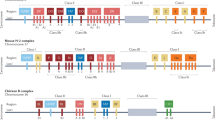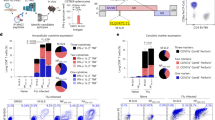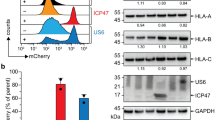Abstract
PRESENTATION of an exogenous protein antigen to helper (CD4+) T-lymphocytes by antigen presenting cells (APC) generally requires that the APCs degrade the native protein antigen into an immunogenic peptide, a process termed 'antigen processing', and that this peptide bind to a major histocompatibility complex (MHC) class II molecule1–3. The complex of peptide and MHC molecule on the APC surface provides the stimulatory ligand for the αβJ T cell receptor4. The intracellular pathways and molecular mechanisms involved in the generation of the peptide-MHC complex are not well understood. Here, we describe several mutant APCs which are altered in their ability to present native exogenous protein antigens but effectively present immunogenic peptides derived from these proteins. The lesions in these mutants are not in the class II structural genes, but they affect the conformation of mature class II dimers.
This is a preview of subscription content, access via your institution
Access options
Subscribe to this journal
Receive 51 print issues and online access
$199.00 per year
only $3.90 per issue
Buy this article
- Purchase on Springer Link
- Instant access to full article PDF
Prices may be subject to local taxes which are calculated during checkout
Similar content being viewed by others
References
Ziegler, K. & Unanue, E. R. Proc. natn Acad. Sci. U.S.A. 79, 1869–1875 (1981).
Shimonkevitz, R., Kappler, J., Marrack, P. & Grey, H. J. exp. Med. 158, 303–316 (1983).
Babbitt, B. P., Allen, P. M., Matsueda, G., Haber, E. & Unanue, E. R. Nature 317, 359–361 (1985).
Saito, T., Weiss, A., Miller, J., Norcross, M. A. & Germain, R. N. Nature 325, 125–130 (1987).
Pious, D., Dixon, L., Levine, F., Cotner, T. & Johnson, R. J. exp. Med. 162, 1193–1207 (1985).
Johnson, J. P., Meo, T., Riethmuller, G., Schendel, D. J. & Wank, R. J. exp. Med. 156, 104–111 (1982).
Pious, D., Erlich, H., Gladstone, P. & Levine, F. Banbury Rep. Cold Spring Harb. Lab. 14, 61–68 (1983).
Demotz, S. et al J. Immun. 142, 394–402 (1989).
Buus, S., Sette, A., Colon, S. M. & Grey, H. M. Science 142, 1045–1047 (1988).
Bjorkman, P. J. et al. Nature 329, 506–518 (1987).
Ziegler, H. K. & Unanue, E. R. Proc. natn Acad. Sci. U.S.A. 79, 175–178 (1982).
Nowell, J. & Quaranta, V. J. exp. Med. 162, 1371–1376 (1985).
Gladstone, P. & Pious, D. Somatic Cell Genet. 6, 285–298 (1980).
Jones, P. P., Murphy, D. B., Hewgill, D. & McDevitt, H. O. Molec. Immun. 16, 51–60 (1979).
Gladstone, P., Fueresz, L. & Pious, D. Proc. natn Acad. Sci. U.S.A. 79, 1235–1239 (1982).
Koning, F., Schreuder, I., Giphart, M. & Bruning, H. Hum. Immun. 9, 221–230 (1984).
Sachs, J. A. et al. Tissue Antigens 28, 199–207 (1986).
Levine, F. et al. Proc. natn Acad. Sci. U.S.A. 82, 3741–3745 (1985).
Mellins, E., Arp, B., Ochs, B., Erlich, H. & Pious, D. J. exp. Med 168, 1531–1537 (1988).
Mellins, E., Woelfel, M. & Pious, D. Hum. Immun. 18, 211–223 (1987).
Celis, E., Ou, D. & Otvos, L. J. Immun. 140, 1808–1815 (1988).
Lanzavecchia, A. Nature 314, 537–539 (1985).
Clark, E. A. & Yakoshi, T. in Leucocyte Typing (eds Bernard, A., Baunsell, L., Dausset, J. & Schlossman, S.) 195 (Springer, Heidelberg, 1984).
Watson, A. J., DeMars, R., Trowbridge, I. S. & Bach, F. H. Nature 304, 358–361 (1983).
Billing, R., Safani, M. & Peterson, P. J. Immun. 117, 1589–1593 (1976).
Cresswell, P. Eur. J. Immun. 7, 636–639 (1977).
Guy, K. et al. Eur. J. Immun. 12, 942–948 (1982).
Gladstone, P. & Pious, D. Nature 271, 459–461 (1978).
Miller, A. D. & Buttimore, C. Molec. cell. Biol. 6, 2895–2902 (1986).
Lane, R., Crissman, R. & Ginns, S. Meth. Enzym. 121, 174–182 (1986).
Dorken, B. in Leucocyte Typing IV (ed. Knapp, W.) (Oxford University Press, in the press).
Cotner, T., Charbonneau, H., Mellins, E. & Pious, D. J. biol. Chem. 264, 11107–11111 (1989).
Author information
Authors and Affiliations
Rights and permissions
About this article
Cite this article
Mellins, E., Smith, L., Arp, B. et al. Defective processing and presentation of exogenous antigens in mutants with normal HLA class II genes. Nature 343, 71–74 (1990). https://doi.org/10.1038/343071a0
Received:
Accepted:
Issue Date:
DOI: https://doi.org/10.1038/343071a0
This article is cited by
-
Distinct editing functions of natural HLA-DM allotypes impact antigen presentation and CD4+ T cell activation
Cellular & Molecular Immunology (2020)
-
Genetics of antigen processing and presentation
Immunogenetics (2019)
-
A personal retrospective on the mechanisms of antigen processing
Immunogenetics (2019)
-
Pharmacogenomic analysis of rhIL-11 treatment in the HLA-B27 rat model of inflammatory bowel disease
The Pharmacogenomics Journal (2002)
-
Immunity against extracellular pathogens
Protoplasma (2000)
Comments
By submitting a comment you agree to abide by our Terms and Community Guidelines. If you find something abusive or that does not comply with our terms or guidelines please flag it as inappropriate.



